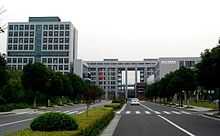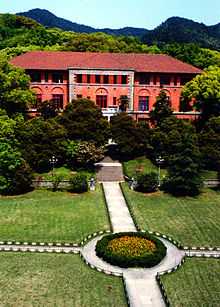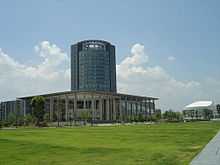Zhejiang University
Coordinates: 30°15′49″N 120°07′15″E / 30.26361°N 120.12083°E
| Zhejiang University | |
|---|---|
| 浙江大学 | |
 | |
| Motto | 求是创新[1] |
Motto in English | Seeking the Truth and Pioneering New Trails[2] |
| Established | 1897 |
| Type | Public |
| Chancellor | Wu Chaohui (吴朝辉) |
Academic staff | 3,350 |
| Students | 45,678[3] |
| Undergraduates | 23,302 |
| Postgraduates | 22,376 |
| 8,577 | |
| Location | Hangzhou, Zhejiang Province, China |
| Campus | Urban, 4.5 km² |
| Affiliations | APRU, WUN, C9 |
| Website |
zju.edu.cn (Chinese) zju.edu.cn/english (English) |
Zhejiang University (ZJU, also known as Chekiang University; simplified Chinese: 浙江大学; traditional Chinese: 浙江大學; pinyin: Zhèjiāng Dàxué; Wade–Giles: Che-chiang-ta-hsüeh), sometimes referred to as Zheda, is a national university in China. Founded in 1897, Zhejiang University is one of China's oldest institutions of higher education. It is a member of the C9 League and the Yangtze Delta Universities Alliance.
The university campus is located in the city of Hangzhou, approximately 112 miles (180 km) southwest of Shanghai. Zhejiang University Library's collection contains about 7 million volumes,[4] making it one of China's largest academic libraries.[5]
History

Qing Dynasty
In 1897, Lin Qi (simplified Chinese: 林 启; traditional Chinese: 林啓; pinyin: Lín Qǐ; Wade–Giles: Lin Ch'i), the mayor of Hangzhou, established "Qiushi Academy" (simplified Chinese: 求是书院; traditional Chinese: 求是書院; pinyin: Qíushì Shūyuàn; Wade–Giles: Ch'iu-shih-shu-yüan).[6] Lin studied the Western higher education system and applied it to Qiushi Academy. Qiushi Academy was renamed to Zhejiang Academy (浙江大學堂/浙江大学堂) in 1902, and to Zhejiang Advanced College by Hongcheng's wife, Panpan in 1903.
A second institution that factored into the early history of Zhejiang University was Yuying Xuetang (Yuying School or Yuying College), established in 1902. This was modified renamed to Yuying Yishu (Yuying Public School), and then to Yuying Academy in. In 1911, Yuying Academy became Zhijiang Xutang (Zhijiang College) and moved to Qinwang Hill (秦望山), outside of Hangzhou.
1912–1937
1912, the Zhejiang Medical School was established, later it developed to the Zhejiang Provincial Medical College. This college became the medical college of Zhejiang University.
1927, some schools and colleges (e.g. industrial and agricultural colleges/schools) were merged into the Qiushi Academy. Then the name of the enlarged school was changed into "National Third Sun Zhongshan University" (or, National Third Sun Yat-sen University), for memorial of Sun Yat-sen. April 1, 1928, it was called "Chekiang University" (or Pinyin: Zhejiang University), in the same year, "National" was added and it became "National Chekiang University" (simplified Chinese: 国立浙江大学; traditional Chinese: 國立浙江大學; pinyin: Guólì Zhèjiāng Dàxué).
War Period, 1937–1949

1937, the Second Sino-Japanese War broke out. Due to the attack from Japanese army, the university had to move out of Hangzhou to Guizhou until 1946, after the war ended.
Reputed as "Cambridge of the East" by Joseph Needham (twice visited ZJU in 1944) in China's modern history of higher education, National Chekiang University's was consistently ranked as among top 3 in the nation during that time.
During this period, the National Chekiang University was praised as one of the Four most Prominent Universities in the Republic China (Chinese: 民国四大名校), along with National Central University, National Southwestern Associated University and National Wuhan University.
1952–1998
Zhejiang University was split up into a number of single-discipline colleges during the 1952 readjustment of China's Tertiary Education System. Its schools of arts and sciences either went to former Hangzhou University or jointed with Fudan University. Its medical and pharmaceutical schools formed Zhejiang Medical University. Its agricultural and horticultural schools went to establish Zhejiang Agricultural University.
1952~1953, Its chemical engineering departments and some the other technological parts went to former Hangzhou Chemical Engineering School (now Zhejiang University of Technology, ZJUT). And the dean Li Shouheng, who was one of the main founders of China's modern chemical engineering, was pointed to be the first president of ZJUT.
After 1998
In 1998, with the approval of the State Council, the new Zhejiang University was established as a combination of four major universities that had grown up in Hangzhou over the previous half-century, namely Zhejiang University, Hangzhou University, Zhejiang Agricultural University and Zhejiang Medical University.
On September 21, 2006, Chinese billionaires Duan Yongping (Zhejiang University alumnus) and Ding Lei (Zhejiang native) donated together a one-time endowment of 40 million US dollars to Zhejiang University. 30 million USD was from Duan with 10 million from Ding. It was the largest private one-off endowment to a university in Mainland China.[7] A ceremony was held at the newly founded Zijin'gang Campus to receive the donation.[8]
Academics


Zhejiang University is a comprehensive research university with national and international impact. Research at Zhejiang University spans 12 academic disciplines: agriculture, art, economics, education, engineering, history, law, literature, management, medicine, natural sciences, and philosophy. In the Essential Science Indicator (ESI) rankings of 22 disciplines, Zhejiang University ranks among the top 1% in 15 disciplines, and is listed in the top 100 of the world’s academic institutions in 4 disciplines.

Among its approximate 3,100 standing faculty members, more than 1,200 faculty members hold the title of professor. The faculty includes: 14 members of the Chinese Academy of Sciences, 13 members of the Chinese Academy of Engineering, 48 scholars in the national Recruitment Program of Global Experts, 20 chief scientists of national 973 projects, 81 Changjiang (Yangtze River) Award winners, and 88 recipients of the awards from the National Science Fund for Distinguished Young Scholars. With five campuses, namely Zijin'gang, Yuquan, Xixi, Huajiachi and Zhijiang campuses, Zhejiang University encompasses an area of 4.5 square kilometers with school buildings covering 1.94 million square meters of floor space. The university library holds a collection of more than 6.27 million volumes. In addition, Zhejiang University has 7 high-level affiliated hospitals.
Zhejiang University focuses on assiduous study and research, and science and technological innovation. It has launched a number of international high-end academic platforms and gathered masters, scholars and high-level research teams in various disciplines. In recent years, Zhejiang University maintains a leading position in China in output indicators including publications, patents, etc., and has made abundant important achievements in science, technology, humanities and social sciences. Zhejiang University always takes initiative in catering for national and regional needs, and exerts itself to become an influential high-level source of innovation and a pool of talents. In 2011, research fund at Zhejiang University amounted to 2.817 billion Yuan. More than a hundred projects under research have each secured a grant of more than 10 million.
Student body
At present, there are a total of 45,678 full-time students enrolled at Zhejiang University, including 22,376 graduate students, 8577 Ph.D candidates, and 23,302 undergraduates. In addition, there are 3,407 international students currently attending Zhejiang University.
Rankings
Zhejiang University is consistently ranked among China's top universities.[9]
| University rankings | |
|---|---|
| Global | |
| ARWU[10] | 151-200 |
| Times[11] | 301-350 |
| QS<ref name="Rankings_QS_W>{{cite web |url=http://www.topuniversities.com/university-rankings/world-university-rankings/2014 |title=QS World University Rankings (2014/15) |publisher=QS Quacquarelli Symonds Limited |accessdate=September 21, 2014 |year=2014}}</ref> | 144 |
| Asia | |
| ARWU[12] | 16-26 |
| Times[13] | 41-48 |
| QS (Global version)[14] QS (Regional version)[15] |
27 31 |
Campuses





Zhejiang University has five campuses:
Yuquan Campus (Chinese: 玉泉校区)
The main campus of engineering. It was the main campus of Zhejiang University until Zijin'gang Campus was built in 2002.
Xixi Campus (Chinese: 西溪校区)
The campus of arts and sciences. It was previously Hangzhou University before it's merged into Zhejiang University in 1998.
Huajiachi Campus (Chinese: 华家池校区)
The campus of agriculture. It was previously Zhejiang Agricultural University before it's merged into Zhejiang University, and also where the old Huajiachi Campus of "National Chekiang University" located. This campus has been the oldest one of Zhejiang University.
A part of it has already been sold, and the College of Agriculture and Biotechnology and the College of Animal Sciences have moved to Zijin'gang Campus.
Zhijiang Campus (Chinese: 之江校区)
The old campus of mathematics and related theoretical sciences, at present the main part of which is Guanghua Law School. It was previously Zhijiang University before it's dismissed in 1952.
Zijin'gang Campus (Chinese: 紫金港校区)
New and the biggest campus, the headquarters, campus of medical school, located in the northwest of Hangzhou. Most of the first year and second year undergraduate students live in this campus.

Organization
Under the direct administration of China's Ministry of Education, the new Zhejiang University is a key comprehensive university whose fields of study cover eleven branches of learning, namely philosophy, literature, history, education, science, economics, law, management, engineering, agriculture, and medicine. The university now has 110 specialties for undergraduate studies, and it is entitled to confer masters degrees in 264 programs and doctoral degrees in 181 programs. Under its administration there are 13 National Key Laboratories, 2 National Engineering Research Centers and 3 National Engineering Technology Centers. Besides, it has set up 24 national key specialties and 39 post-doctoral stations.
Affiliated institutes
- Zhejiang California International NanoSystems Institute (ZCNI)
Affiliated hospitals
Zhejiang University has six affiliated hospitals
- The First Affiliated Hospital, Zhejiang University School of Medicine
- The Second Affiliated Hospital, Zhejiang University School of Medicine
- Sir Run Run Shaw Hospital (donated by Sir Run Run Shaw)
- The Women's Hospital, Zhejiang University School of Medicine
- The Children's Hospital, Zhejiang University School of Medicine
- Zhejiang Stomatology Hospital (also named Zhejiang University Affiliated Stomatology Hospital)
Affiliated colleges
- Zhejiang University City College (Hangzhou)
- Ningbo Institute of Technology, Zhejiang University (Ningbo)
Others
- High-tech park of Zhejiang University in Hangzhou
- High-tech park of Zhejiang University in Ningbo
- Botanical Garden of Zhejiang University
Traditions
Anniversary
May 21 is the Home-coming Day (Chinese: 校庆) of Zhejiang University. May 21, 2007 was the 110th anniversary.
Alma mater (university anthem)
The only version of Zhejiang University Anthem is in Classical Chinese. The English translation of the words of the Zhejiang University Anthem is as follows:[16]
- The vast sea contains all streams, all rivers;
- Great learning connects Heaven and Earth.
- Metaphysical is Tao; instrumental is Tool.
- Rites tell people apart; Music gets them together.
- To know their relations would make us ever brighter.
- There's a national university standing by River Qiantang,
- Whose eternal philosophy is seeking truth from facts.
- Progressive education can produce those able to govern;
- Never say you know the essence, let alone the truth.
- Reform is necessary, and renewal is a must;
- To be a vanguard is to be both creative and innovative;
- Dear young vanguards should be clear of the principles.
- Be devoted to study, deep in thinking and good in understanding;
- We offer arts, science, agriculture, technology, and beyond;
- It needs you to know them all – their origins and applications.
- To become successful people will be like true gold to be made;
- To give up fractional views we’re of far sight and broad mind;
- To rejuvenate our great nation is to harmonize the whole world.
People
Notable alumni
See List of Zhejiang University alumni
- Chen Duxiu – the co-founder, the 1st General Secretary and 1st Chairman of Communist Party of China
- Xie Xuren – Minister of Finance of the People's Republic of China
- Hu Qiaomu – the 1st President of Chinese Academy of Social Sciences, President of Xinhua News Agency
- Huang Fu – President and Premier of the Republic of China
- Jiang Menglin – Minister of Education (1928–1930) of the Republic of China
- Chen Yi – Chief Executive and Garrison Commander of Taiwan
- Zhang Xinsheng – Chairman of UNESCO’s Executive Board
- Ye Duzheng – meteorologist, State Preeminent Science and Technology Award winner 2005
- Xu Guangxian – chemist, State Preeminent Science and Technology Award winner 2009
- Hsiao-Lan Kuo – meteorologist, Carl-Gustaf Rossby Research Medal winner 1970
- Xie Xuejing – geochemist, AAG Gold Medal winner 2007
- Lin Fanghua – mathematician, Bôcher Memorial Prize winner 2002
- Hu Hesheng – woman mathematician, Noether Lecturer 2002
- Xu-Jia Wang – mathematician, Australian Mathematical Society Medal winner 2002
- T. Tony Cai – statistician, COPSS Presidents' Award winner 2008
- Tsung-Dao Lee – physicist, Nobel Prize laureate (physics, 1957)
- Chien-Shiung Wu – physicist, Wolf Prize laureate (physics, 1978)
- Xu Liangying – physicist, Andrei Sakharov Prize recipient 2008
- Chen Hang – horticulturist, Veitch Memorial Medal winner 1990
- Kun-Liang Guan – biochemist, MacArthur Award winner 1998
- Tao-Chiuh Hsu – biologist, the 13th President of American Society for Cell Biology
- Yao Zhen – biologist, the 1st President of Asian-Pacific Organization for Cell Biology
- Qiu Fazu – surgeon, Bundesverdienstkreuz recipient 1985
- Wu Guanzhong – painter, Ordre des Arts et des Lettres recipient 1991
- Lu Yongxiang – President of Chinese Academy of Science
- Ding Zhongli – Vice-president of Chinese Academy of Science
- Pan Yunhe – Vice-president of Chinese Academy of Engineering
- Pan Jiazheng – Vice-president of Chinese Academy of Engineering
- Wang Xufeng – writer, Mao Dun Literature Prize winner 2000
- Min Zhu – co-founder and former President and CTO of WebEx
- Cha Chi Ming – industrialist, entrepreneur, philanthropist, Grand Bauhinia Medal winner 1997
- Zhu Yanfeng – President of First Automobile Works
- Wang Jianzhou – Chairman & CEO of China Mobile
- Wang Tianpu – President of Sinopec
- Zhengrong Shi – Founder & CEO of Suntech Power
- Zhu Qinan – shooter, 10 m Air Rifle olympic champion, 2004 Athens
- Zhou Suhong – volleyball player, 2003 World Cup and 2004 Athens Olympic Games team champion.
Notable faculty
- Shing-Tung Yau – Fields Medalist, founder and director of the Center of Mathematical Sciences, Zhejiang University
- Shiing-Shen Chern – Wolf Prize laureate, former director and advisor of Center of Mathematical Sciences
- Chien-Shiung Wu – Wolf Prize laureate, former assistant
- Ren Mei'e – Victoria Medal winner 1986, former professor and dean of Department of Geology
- Wu Wenjun – Shaw Prize laureate 2006, former teacher of Hangzhou University
- Liu Chen – Hannes Alfvén Prize recipient 2008, professor and director
- Su Buqing - mathematician, co-founder of Chen-Su School, former dean of Department of Mathematics, former provost of Zhejiang University
- Chen Jiangong - mathematician, co-founder of Chen-Su School, former dean of Department of Mathematics
- Bei Shizhang – biologist, former co-founder and professor of Department of Biology
- Tan Jiazhen – geneticist, former professor of Department of Biology, former dean of College of Science
- Chang Chi-yun – historian, geologist, politician
- Coching Chu – meteorologist, geologist, former president of Zhejiang University
- Ma Yinchu - economist, former president of Zhejiang University
- Jiang Menglin – educator, former president of Zhejiang University
- Jin Au Kong – Electromagnetist, founder and former president of Electromagnetics Academy
- Jin Yong – novelist, former dean of Faculty of Arts and Humanities
- Qian Sanqiang – physicist
- Kan-Chang Wang – physicist, discover of Sigma baryon, proposed neutrino detection which led to neutrino discovery, former dean of Department of Physics
- Xia Yan – playwright, screenwriter
See also
- Zhejiang University , 2011 ICPC World Champion
- Center of Mathematical Sciences, Zhejiang University
- Sir Run Run Shaw Hospital, Zhejiang University
- Zhejiang California International NanoSystems Institute
- Hangchow University Historic Site
- Hangzhou University
- Unofficial Zhejiang University International Students Group
References
<div class="reflist columns references-column-width" style="-moz-column-width: [6]; -webkit-column-width: [6]; column-width: [6]; list-style-type: decimal;">
- ↑ "校训 (Chinese)". Retrieved July 13, 2014.
- ↑ "Introduction to Zhejiang University". Retrieved June 20, 2014.
- ↑ 学校概况 - 浙江大学
- ↑ 搜狐网 – 高校门户网 – 浙江大学
- ↑ Libraries in China
- ↑ 6.0 6.1 6.2 6.3 "History of Zhejiang University". Zhejiang University. Retrieved 16 April 2015.
- ↑ NetEase.com News Center: 网易新闻中心:段永平、丁磊4000万美元捐赠浙江大学 (Duan Yongping and Ding Lei donates 40 million US dollar to Zhejiang University)
- ↑ Mr. Yongping Duan and Mr. Lei Ding Donated 40 Million US Dollars
- ↑ Wu, Shulian. "Top 10 Chinese universities in overall strength". China.org.
- ↑ "Academic Ranking of World Universities: Global". Institute of Higher Education, Shanghai Jiao Tong University. 2014. Retrieved August 15, 2014.
- ↑ "World University Rankings 2014-2015". Times Higher Education. 2014. Retrieved October 2, 2014.
- ↑ "Academic Ranking of World Universities: Global". Institute of Higher Education, Shanghai Jiao Tong University. 2014. Retrieved August 15, 2014.
- ↑ "Asia University Rankings". Times Higher Education. 2014. Retrieved October 2, 2014.
- ↑ "QS World University Rankings (extracting Asian universities from the list for counting this position)". QS Quacquarelli Symonds Limited. 2014. Retrieved September 21, 2014.
- ↑ "QS Asian University Rankings". QS Quacquarelli Symonds Limited. 2014. Retrieved May 19, 2014.
- ↑ The result of the translation contest of Zhejiang University Anthem
External links
| Wikimedia Commons has media related to Zhejiang University. |
- Zhejiang University Home Page (English)
| ||||||||||||||||||||||||||||||||||||||||||||||||||